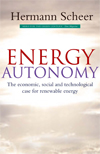 Article published in NewScientist, May 21st, 2008
Article published in NewScientist, May 21st, 2008
We have heard all about Al Gore's inconvenient truths on climate change. Now comes an extremely convenient truth from his German counterpart. Social Democrat MP Hermann Scheer, who has been dubbed more revolutionary than Greenpeace, says the great unspoken truth is how painless it will be to convert the world to renewable energy, especially solar power.
So much so that the Kyoto protocol is a waste of time that makes what is easy and cheap seem hard and expensive. The sun king tells Fred Pearce we are as close to the solar revolution now as we were, a decade or so ago, to the cellphone revolutionYou are not a physicist or an engineer, so how did you get involved in solar energy?
It was in 1986. I was the spokesman on nuclear disarmament for the Social Democrats in the German parliament. This was at the time of Ronald Reagan's Star Wars, the Strategic Defense Initiative or SDI. I wrote a book called The Liberation from the Bomb, a strategy for global nuclear disarmament. That included ending our dependence on nuclear energy, so I had to think about energy alternatives.
I had not read a single book on renewable energy. I just did my own thinking and I wrote a chapter suggesting a new SDI, the Solar Development Initiative.
So you began with political objectives?
Yes. But while my book got good reviews, the main criticisms were about my solar proposals. The experts said I should stick to things I understood. So I made myself an expert, and my gut feelings were right. A large proportion of Germany's electricity could be generated from the sun, and the barriers to achieving this are political, not economic or technological.
What did you do about it?
Ten years ago, I called for a programme to install solar panels on 100,000 roofs in Germany, so that we could have mass production as soon as possible. I wanted it in my party's programme in the 1998 elections. Even Greenpeace said my plan was unrealistic, and my colleagues asked why we should be more radical than Greenpeace. But I persuaded them, and the programme was implemented within four years. In 2000, with colleagues, I launched the Renewable Energy Sources act, which ensures that independent producers generating excess electricity can sell it to the grid at a guaranteed price. Now renewables account for nearly 15 per cent of electricity generated in Germany.
You are very critical of the Kyoto protocol. Why?
The protocol starts from the premise that the solutions to climate change will be an economic burden. So it is all about how we share this burden. But it is not an economic burden; it is a new economic opportunity. So I don't accept the idea of issuing emission rights that can be traded. It is like giving rights to trade in drugs, and saying drug dealers can buy and sell those rights.
But you can't make all carbon dioxide emissions illegal, can you?
No. But this is an ethical question. It is not normal in civilised societies to dump household waste in the street. You pay for it to be taken away. But with energy emissions we are allowed to dump our waste in the atmosphere.
I was the only person to vote against the emissions trading law in the Bundestag [the German parliament]. I said that it goes against all our experience on how technological revolutions happen. Of all the technological revolutions in the last 200 years, which of them happened because of an international treaty? Not one. They happened because they were accepted as important, superior and necessary for the future.
What technologies should be part of that revolution? You pushed through tax exemptions for biofuels in Germany, but many people are now having second thoughts.
Biofuels are a delicate problem. It is a mistake simply to replace fossil fuels with biofuels without ensuring the sustainability of the agricultural system that produces them.
Is there enough land to supply both food and energy?
Yes, but it all depends on how things are done. It is a great mistake to think about growing biofuels only from the few plants that provide food. You couldn't go about it in a worse way than trying to turn corn into ethanol, as the US is doing.
The first step should be to make use of residues from food production. Ninety per cent of the biomass, like straw, is not used for food. Refining it to make biofuels would provide a second income for farmers, and the waste from biorefineries, like ash, could be used to replace chemical fertilisers. In this integrated system, biofuels would be the basis for organic agriculture and there would be no competition for land between food and fuel.
Don't these changes in energy technology require changes in the way our society is organised?
To take advantage of this integrated system, we have to have localised energy production, near the farms. Solar and wind power is also best provided locally. This is completely different from the fossil fuel energy system, where production and consumption are separate - often on opposite sides of the world - and you need a huge amount of infrastructure to link them up.
The German government is talking about sticking with fossil fuels like coal, but capturing and burying the emissions. Isn't this a practical low-carbon solution?
I believe it is a fake. Carbon capture is technologically but not economically feasible. It reduces energy efficiency, because of the energy needed to capture the carbon dioxide and run the extra infrastructure. And at the end, you still have the problem of making sure the carbon stays safely in storage for thousands of years. It is like the problem with nuclear waste, possibly even worse.
Today, this idea is being used as a justification for building new coal-fired power stations, with the promise that in maybe 15 years the carbon could be captured. These promises won't be fulfilled. In any case, carbon capture would cost much more than renewables, so why bother?
People talk about introducing a low-carbon economy. I don't like that term. It is a way to smuggle in nuclear power generation and carbon capture. We should talk instead about a renewable energy economy. There is plenty of renewable energy for all our needs.
Many environmentalists are pessimists and don't believe in technical fixes. But you are a real techno-optimist.
Yes, because I see the opportunities for renewables. I see that they can provide 100 per cent of our energy, and they can be introduced very fast. All the great technological revolutions happen much more quickly than even the experts and enthusiasts guess. The forecasts for the spread of cellphones and IT were all overtaken by the reality. The renewables revolution will be the same. The IT and mobile phone revolutions were also the first technological revolutions in modern times that were not about centralising power. They were about decentralising. And this will happen to energy from renewables. The big old-fashioned power stations and long supply chains will be replaced by local supplies for local markets. This is changing the tide of history.
How is your house powered?
By a solar panel. My roof produces more power than I need myself.
This article appears in issue 2657 of New Scientist magazine, 21 May 2008, written by Fred Pearce, and has been posted on this site with permission from New Scientist.
© Reed Business Information.



